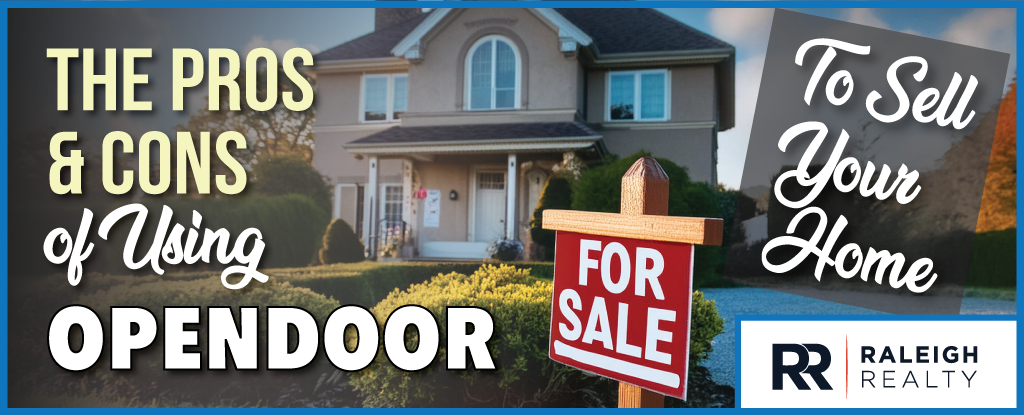Pros and Cons of Using Opendoor to Sell Your Home
Are you considering selling your home to Opendoor? Here are the pros and cons of using Opendoor to sell your home!
If you're considering selling your home, you've likely heard about Opendoor and other iBuying companies that promise to simplify the home-selling process.
Opendoor is an iBuying (instant buying) company that uses automated valuation models and data analytics to make cash offers on homes within 24 hours.
The company launched in Raleigh in 2018 and has since become a notable player in our local market, though its presence has fluctuated with market conditions.
Companies like Opendoor target fast-growing, affordable regions to capitalize on everyone moving to the area. Selling your home to Opendoor is worth it for people who want a more convenient sale rather than higher profits.
Since Opendoor is a company looking for profit, it has to buy your home for as little as possible. This is unlike a Real Estate Agent, whose goal is to secure you the highest price possible when selling your home.
The Real Estate Agent does take a fee, though the best Agents usually net you a price far higher than their commission, making the return on investment more than worth it.
In many ways, Opendoor seems too good to be true. They send an all-cash offer in less than 24 hours, provide a free home inspection, and ultimately eliminate the hassle of selling a home.
As local real estate professionals, we've seen firsthand how these services compare to traditional real estate transactions in our market. The following pros and cons of using Opendoor will indicate if working with Opendoor is the right decision for you.
Here is what you need to know about using Opendoor
1. Pro: Speed and Convenience
The most significant advantage Opendoor offers is speed. This is particularly valuable for homeowners who need to relocate quickly for work or other urgent circumstances.
Opendoor has tried to make the registration process seamless for sellers. Homeowners can visit Opendoor's website and fill out a form with questions regarding their homes.
Within 24 hours, Opendoor sends them an offer price. Opendoor also pays for the home inspection, eliminating that cost for sellers. Most importantly, Opendoor removes the process of selling the home, which is a major motivator for many sellers.

2. Pro: Works for Experienced Sellers
If you are an experienced seller with several years of real estate insight, Opendoor may be for you.
Because Opendoor leads the purchasing process on its terms, it is imperative to have a firm grasp of the market and understand the real estate industry exceptionally well before moving forward with them so that you don't risk losing significant funds.
Those selling their home for the first time or who don’t have a strong understanding of the real estate market risk losing a large portion of their net proceeds if Opendoor sends a low offer that is well below the market rate.
Sellers who choose to work with Opendoor should be strong negotiators and be prepared to discuss repair costs and negotiate the many other fees that come with using Opendoor.
3. Pro: Minimal Showings and Disruption
Opendoor typically requires only one inspection visit, eliminating the stress of keeping your home show-ready for weeks or months. For busy Raleigh families, this can be a significant advantage.
4. Pro: Cash Offer
When working with buyers, there is always a fear that financing will fall through. Receiving an all-cash offer gives sellers peace of mind and eliminates the time it takes for the lender to process a loan application, so it makes sense that this would be a strong selling point for Opendoor.
5. Pro: Flexible Closing Timeline
Opendoor often allows sellers to choose their closing date, which can be helpful for coordinating moves or timing the sale with a new home purchase.
6. Con: Lower Sale Price
Opendoor is a profitable organization because it buys your home at a discount, marks it back up to its fair market value, and sells it. This allows Opendoor to make money on both sides of the transaction through the fees/built-in equity when purchasing and the increase in total sales price when the home closes.
The most significant drawback is typically receiving less money for your home. Opendoor's business model requires them to purchase homes below market value to account for:
- Repair costs (their "service charge" averages 5-7%)
- Holding costs while the property is on their books
- Transaction costs
- Profit margin
In the Raleigh market, this often translates to offers that are 3-8% below what you might achieve through traditional sale methods.
7. Con: Limited Property Types
Opendoor is selective about the homes they purchase. They typically focus on:
- Homes built after 1960
- Properties valued between $150,000 and $750,000
- Single-family homes in good condition
- Homes in suburban neighborhoods
Many unique properties in Raleigh's historic areas, custom homes, or properties needing significant repairs won't qualify.
.png)
8. Con: Hefty Fees
Opendoor charges a minimum 5% service fee. State and local fees also vary on Opendoor and vary depending on the specific location.
Opendoor bases their price on how long it will take to sell your home, the comparable homes for sale in your area, and your home's features.
9. Con: Rushed Sales Process
Selling a home is one of the most important transactions you may ever experience. For many people, their home is their most significant asset, and losing money on that asset could be a tremendous loss.
Opendoor may take advantage of those unaware of market rates and don’t have a firm grasp on the real estate industry. They may do this by offering to buy your home below market value or deducting significant proceeds from the offer price to fund repair costs.

10. Con: Limited Negotiation
Unlike traditional real estate transactions where terms can be negotiated, Opendoor's offers are typically take-it-or-leave-it propositions with limited room for discussion.
11. Con: Not Beginner Friendly
If you have had your real estate license in the past or have had considerable experience buying and selling homes, Opendoor may work for you if you are trying to sell your home in a hurry.
You must know the questions to ask and potential red flags to be on the lookout for. Opendoor can sometimes price homes below market, which some sellers may not realize if they are unfamiliar with the housing market.
They may also not know how to negotiate repair costs and spend far more than they would if they had listed their home with a traditional Real Estate Agent.
12. Con: Transactional Experience
Buying or selling a home is an emotional experience. When selling your home traditionally through an agent, you can find a buyer who falls in love with your home and offers a price that may be above what you're asking for.
Opendoor eliminates that emotional element of the sale and makes it purely transactional, meaning sellers may miss out on buyers willing to pay far more.
13. Con: Only Available in Certain Areas
Opendoor does not operate in all states and primarily concentrates on large metropolitan areas with within certain states with significant real estate activity and demand.
.png)
14. Con: Market-Dependent Availability
Opendoor's presence in Raleigh has varied with market conditions. During the 2022 market shift, they significantly reduced their operations and temporarily stopped buying homes in some areas. This means the service isn't always available when you need it.
15. Con: No Professional Advocacy
When you work with Opendoor, you're essentially on your own throughout the process. Traditional real estate agents provide valuable advocacy, negotiating not just on price but on inspection repairs, closing timeline adjustments, and contract terms.
They also help you understand market conditions and timing. With Opendoor, you lose this professional guidance and representation, which can be particularly important in complex situations or when unexpected issues arise during the transaction.
.png)
Methodology
Data was sourced from Bankrate and Triangle Business Journal to determine the pros and cons of using Opendoor to sell your home.
FAQs
Should I sell my house through Opendoor or a Real Estate Agent?
If you are hoping to get top dollar for your home, working with a Real Estate Agent is advised. A Real Estate Agent will market your property heavily and work hard to put it in front of as many buyers as possible. When working with an agent, you are far more likely to receive an offer from a buyer willing to pay your asking price (or more).
Opendoor may sell your home quickly, but you will pay a considerable premium for that service. You may also miss out on buyers willing to pay far more for your home than Opendoor. While working with a real estate agent, you can also work with Opendoor to see which works better for you.
When is the best time for sellers to use Opendoor?
If your sole prerogative is to offload your property as quickly as possible and obtain a higher price point for your home, which is not your top priority, Opendoor may be for you. They will move the process along quickly, but that comes at quite a hefty price.
Meanwhile, a strong Real Estate Agent will typically obtain an offer for the buyer within the first two weeks of listing the house for sale. They will also negotiate repairs and closing costs quickly and efficiently, moving the process along as fast as possible.
Is Opendoor an example of an iBuyer?
A new service called iBuying has become popular in the real estate industry. iBuying seeks to streamline the home selling process through technology, offering a quick method for sellers to offload their property.
Opendoor is an example of iBuying because its model is focused on speed and efficiency, and it takes place primarily online. iBuyers are not individuals. They are corporations that purchase properties with cash, fix them up, and then resell them for a profit, which is Opendoor's model.
What is the risk of using Opendoor?
With the rise in technology, realtors have seen significant changes in how buyers and sellers complete transactions. Technology has been advantageous in helping streamline transactions, making it far easier for buyers, sellers, and even realtors to find homes for sale, research a high listing price, and prepare for a sale.
However, technological advancements can come with some downsides. Some elements of the transaction process should not be put solely in the hands of a computer or a corporation. It should be placed in the hands of a trusted Realtor with your best interest at heart, especially considering that buying or selling a home is one of the most significant transactions many individuals will ever make.
Key takeaways on Opendoor
While everyone may feel differently about Opendoor, we think they do a disservice to sellers. Working with a speedy service such as Opendoor means paying substantial fees and getting a significantly reduced price on your home than you would if you chose to work with an experienced Real Estate Agent.
While Opendoor can provide convenience and speed, most homeowners will net more money through traditional real estate sales. Even though th Opendoor process may seem incredibly appealing, the fees and lost funds will not make it worth it in the long run.
Working with an experienced Real Estate Agent almost always means you will have an offer on your home within the first two weeks, so the timeline isn't much longer when working with a Real Estate Agent vs. Opendoor. Sometimes it is even faster to work with a Realtor.
Unless you are an experienced seller with several years of experience buying and selling homes, it is always advised to save yourself the hefty fees and work with a Real Estate Agent who understands the market and will make your transaction their top priority.
Whether you're considering Opendoor or a traditional sale, we can help you:
- Analyze your home's market value using local expertise
- Understand realistic timelines for your specific property
- Develop a strategy that aligns with your goals and timeline
- Navigate the local market
Ready to explore your options for selling your home? Contact Raleigh Realty today. Our local expertise and commitment to your success make all the difference.




